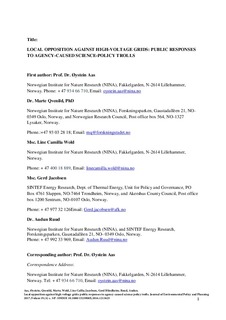Local opposition against high-voltage grids: public responses to agency-caused science policy trolls
Journal article, Peer reviewed
Accepted version

Åpne
Permanent lenke
http://hdl.handle.net/11250/2474266Utgivelsesdato
2017Metadata
Vis full innførselSamlinger
- Publikasjoner fra CRIStin - NINA [2364]
- Scientific publications [1392]
Originalversjon
Journal of Environmental Policy and Planning. 2017, 19 (4), 347-359. 10.1080/1523908X.2016.1213625Sammendrag
High-voltage (hV) transmission grids are projects of societal importance that potentially have controversial social and environmental impacts. Former research shows that public opposition is sparked by the perception of negative local impacts and unjust concessionary processes. In this paper, we complement these perspectives by assessing the institutional practices of the regulatory agencies in dealing with scientific uncertainties. The regulatory agencies’ ‘ways of doing things’ are often designed to serve policy and management needs. A critical point is that the demarcation between scientifically based facts, values and assessments is often blurred in the decision-making process. This paper draws on two Norwegian case studies to investigate how the regulatory agencies dealt with (1) electromagnetic fields and health risks and (2) overhead lines versus sea cables. We argue that ambiguities and uncertainties that arise in the hV transmission line processes create‘trolls’, and we explore how the local inhabitants and affected stakeholders in the two cases responded to these and how it triggered further opposition. By investigating how and why trolls appear and are handled, we conclude by discussing how public opposition related to hV transmission grids may be reduced – Renewable energy planning; value assessments; public engagement; decisionmaking; monster; public issues; boundary objects